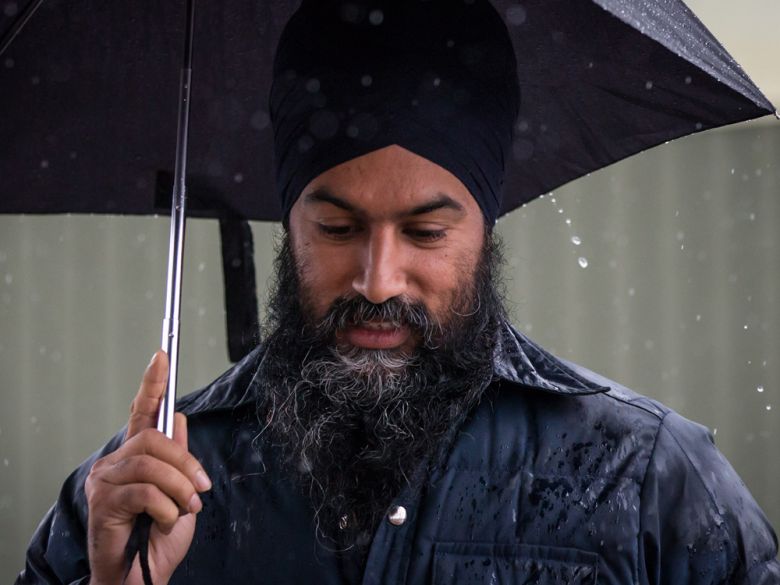The most important number in Canadian politics in 2019 may not be Justin Trudeau’s approval numbers or the horse race between the Liberals and the Conservatives.
The number everyone in Ottawa is captivated by? The one showing the steady decline in support for the New Democratic Party in 2018. A recent Ipsos Reid poll shows the party at 18 per cent support, down five percentage points since March.
Trudeau’s approval numbers have also been plummeting in the last year, but Liberals say that’s the cost of governing, especially when the financial markets are trembling and Alberta is in an uproar about a lack of access to markets for oil producers. Most political operatives, on all sides, point out that Canadians tend to give the benefit of the doubt to an incumbent with a majority.
But all three major parties are affected by the NDP’s recent struggles under new leader Jagmeet Singh, who will be vying for a seat in an upcoming byelection in Burnaby, British Columbia.
Daycare operator Karen Wang wins Liberal nomination in Burnaby South
In the ‘Republic of Burnaby,’ Jagmeet Singh tries to prove he’s more than an Instagram politician
Andrew Scheer’s to-do list: How the Conservatives can take advantage of Trudeau’s vulnerability in 2019
Going into an election campaign with a weak NDP and a strong Liberal Party “has catastrophic implications for Andrew Scheer,” said Ken Boessenkool, a former strategist for Stephen Harper. “Andrew faces a tough set of circumstances. Most of which are out of his control.”
The last Conservative majority government, in 2011, benefited from a surge by Jack Layton’s NDP that stripped seats away from the weakened Liberal Party. Now, the situation is reversed and Conservatives worry that an NDP collapse in the 2019 election is imminent.
A major problem for the NDP is that it doesn’t have an identity, said Andrew MacDougall, a former director of communications for Stephen Harper. At various times in its history, the party has been both a highly-principled leftist party that would forsake power to stay true to itself and, under Layton and former leader Thomas Mulcair, a pragmatic party that could open up a big tent and potentially win an election.
“Trudeau has moved so far to the left that he’s crowded them out of their own issues,” said MacDougall, who believes these problems are compounded by Singh, who he described as “complete nullity” who “looks impotent.”
Prime Minister Justin Trudeau in Calgary, on Thursday November 22, 2018. Leah Hennel/Postmedia
Boessenkool said the top issue for the 2019 election campaign will be the carbon tax and said he expects it to resemble the 1988 election, which saw Liberal leader John Turner battle Brian Mulroney almost exclusively on a newly-signed free trade agreement with the United States.
Although irregular migration and immigration have been dominating the news recently, Boessenkool said it’s unlikely the Conservatives will want to fight an election campaign on that issue, because the party is split on it. “The undertones of it divides the conservative movement,” he said. Most parties prefer to fight elections on issues their base is in full agreement on and which divide the opposition party.
The federal-provincial relationship could be one of the continuing stories of 2019, said Shane MacKenzie, an associate at the public relations firm Ensight and former social media coordinator for the Liberal Party.
“Unlike complaints during the Harper era of inaction and unresponsiveness, the current complaints under Trudeau are about overreach and turf,” said MacKenzie. Most of that centres on the carbon tax, which several provinces are fighting in court “but nothing worth doing is ever easy,” he said.
Silence speaks volumes when introducing yourself to voters
MacDougall agreed that the spectacle of the angry premiers is something Canadians will notice.
“People who don’t follow politics closely see a lot of disharmony in Canada,” he said. Whether it’s provincial squabbling, the carbon tax or the heated debate around irregular migration, it gives the impression that the government has lost control.
Although Doug Ford’s Progressive Conservative Party won a majority government in Ontario, there’s not a lot of lessons or benefits that are transferable to the federal Conservatives, Boessenkool said.
The Liberal government had been in power for more than a decade and the electoral map doesn’t quite line up for the Conservative Party the way it did for the Progressive Conservatives in Ontario.
“The Etobicoke seats, for example, where Ford cleans up, those aren’t very accessible to the federal party,” said Boessenkool.
MacDougall said the federal party could learn from Ford’s relentless and simple messaging on the environment, which described it as a pocketbook issue and involved dismantling Ontario’s cap-and-trade program and fighting the federal carbon tax.
“It’ll be more comfortable for Scheer when he has his own plans on the climate,” said MacDougall.
Conservative Leader Andrew Scheer speaks with the media following Question Period in Ottawa, Tuesday December 4, 2018. Adrian Wyld/CP / THE CANADIAN PRESS
That could be an uphill battle for Scheer, with so much noise coming from the provinces about the government’s climate change plans. The strong message from the Ford government could swamp the federal party’s message, said MacKenzie.
“Scheer…hasn’t released a climate plan, so Ford, Trump, and Harper’s voices speak for him among voters,” said MacKenzie, via email. “Silence speaks volumes when introducing yourself to voters.”
And although polls have been in flux recently, Canadians continued to agree on one thing in 2018, at least: two-thirds of people think Question Period is just “politically-charged theatre” that should be improved.
Here's why Conservatives will be obsessing over the NDP's poll numbers in 2019


























